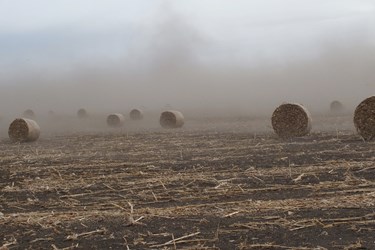Pros And Cons Of Bioreactors In Combating Nitrates
Bioreactors may be a good way to address farm run-off and tame the high nitrate content in environmental waters, but that does not mean farmers will necessarily want to pay for them.
That's according to a top agriculture stakeholder in Iowa, where nitrate levels are soaring this year.
Keegan Kult of the Iowa Soybean Association explained the challenge of this technology: It's not of great benefit to the farmers who would have to pay for it.
“A bioreactor will cost on average about $8,000, and when you look at it in terms of cost per pound of nitrogen removed, it’s very competitive with the other denitrification practices that are out there, and it’s actually cheaper than what a cover crop would be, in terms of cost-per-pound removed, but we’re not going to see that in-field benefit from a bioreactor,” he said, WHO TV recently reported.
“There’s no direct agronomic benefit of these edge-of-field practices to the producer, so finding cost-share for producers to be able to take advantage of is very important,” he continued.
Bioreactors are a simple technology, according to the report.
"Using a network of underground drainage pipes called a tile line, a portion of the outgoing flow is routed through a bed of wood chips, where bacteria process nitrates from the water and expel it as gas," the report said.
Saturated buffers work similarly, according to Kult.
“What we do is we redirect that tile flow and let it drain through the soil profile of the buffer, whereas right now there’s a pipe that goes through the buffer, so it bypasses that buffer system. And instead of using wood chips for the carbon source, we actually use that organic material that’s in that buffer’s soil profile, and that’s what spurs denitrification in that system,” he said, per the report.
Iowa faces considerable challenges with nitrates this year.
Rainfall "is washing fertilizer off the farms and into rivers that provide drinking water to much of the state. Public officials say the problem will pass, but others worry about the potential risks of a compound called nitrate, which has reached levels never seen in Iowa," according to Fox News.
Bob Hirsch, a research hydrologist for the U.S. Geological Survey, explained the risks he sees this year.
"These numbers are so high that they're not only problematic from an ecological standpoint for the rivers, lakes, ponds, and reservoirs, but they become a real issue for human health," he said, per the report.
How are utilities addressing the challenges?
"Nitrate levels at record highs in the Des Moines and Raccoon rivers over the past three months have forced the Des Moines Water Works to again use its nitrate removal facility, the agency said [in December]," according to the Des Moines Register.
Check out Water Online's Nutrient Removal Solution Center.
Image credit: "October 2012 Wind Storm 10 of 11," USDA NRCS South Dakota © 2012, used under an Attribution-ShareAlike 2.0 Generic license: https://creativecommons.org/licenses/by-sa/2.0/
http://www.wateronline.com/doc/pros-and-cons-of-bioreactors-in-combating-nitrates-0001
